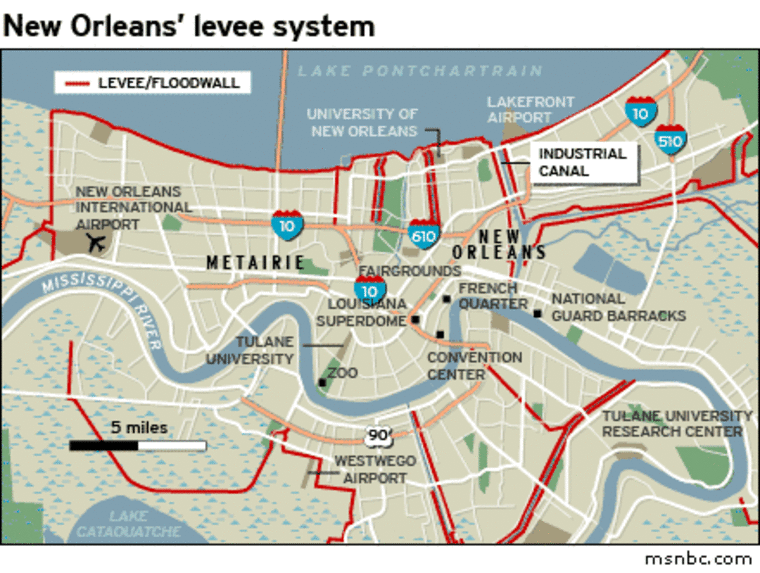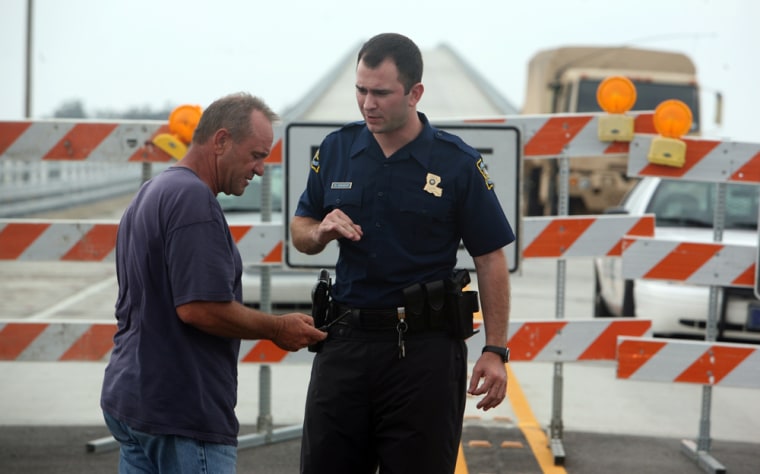Anxious evacuees clamored to come home Tuesday after Hurricane Gustav largely spared New Orleans and southern Louisiana, but were cautioned to wait for the restoration of power and other critical services knocked out by the storm.
A day after the city's improved levee system kept the streets dry as a weakened Gustav passed through, there was quiet pride in a historic evacuation of nearly 2 million people. Only eight deaths were attributed to the storm in the U.S. The toll from Katrina three years ago exceeded 1,600.
"The reasons you're not seeing dramatic stories of rescue is because we had a successful evacuation," said Homeland Security Secretary Michael Chertoff. "The only reason we don't have more tales of people in grave danger is because everyone heeded ... the instructions to get out of town."
The focus turned to getting those 2 million people back home. Gov. Bobby Jindal said officials are focused on taking care of the roughly 1,000 critical-needs medical patients evacuated from hospitals and nursing homes, while also working with utilities to restore the more than 1.4 million power outages.
Tense moments
Evacuees far away from their homes were growing restless.
At a New Orleans checkpoint at U.S. 90, several residents were angered at being turned back by state troopers. But troopers said they were just implementing a plan put forward by local officials. Complicating matters was that several boats from a marina on Catherine Island had washed up on the highway; other boats at the marina were heavily damaged or sunk.
There were fights at an overcrowded shelter in Shreveport, where doctors worried about medications running out and took several people to the hospital.
At a church in Fort Worth, Texas, Denise Preston was rushed to the hospital with a fever. The new mother endured a 12-hour bus ride with her infant son, just a week after giving birth via Caesarean section, to flee her home about 60 miles southwest of New Orleans.
"It's frustrating. I'm ready to go now," Preston said. "They haven't said too much on the news about what's happened in my town. ... Me and the baby sleeping on a cot is hard. He has a crib, but he won't sleep in it."
Still facing 'major challenges'
Gustav is no longer a hurricane, but is still an ugly storm that's expected to dump several inches of rain in northern Louisiana and east Texas. Jindal said Louisiana was only at "halftime" and was worried the damage from rain could exceed Gustav's pounding of the coast.
"This is a serious storm that has caused serious damage in our state," Jindal said before leaving Baton Rouge for a helicopter tour of the mostly rural, low-lying parishes along the state's southeastern and central coast, also home to the state's oil and natural gas industries.
"We're pleased we have not seen major flooding in New Orleans and places that flooded before, but we are facing major challenges in other parts our state."
In Mississippi, where sections of the Gulf Coast were still isolated by flood waters, Gov. Haley Barbour urged residents not to return to their homes until Wednesday.
John Furey, 65, of Pearlington, sat at an island in the flooded kitchen of his 70-year-old brother Pat's home. Both were still working to repair damage from Katrina when Gustav arrived — the only two floods to hit John's red brick home since 1964.
"This is the second time in three years," Furey said. "I just settled with State Farm in March."
Oil companies and rig owners, which shut down virtually all oil and natural gas production in the Gulf as Gustav approached, headed out to look for damage. Some were already putting equipment and people back in place to resume operations, and a several-dollar drop in the price of a barrel suggests traders were confident the storm didn't cause much damage.
President Bush, who monitored the storm from Texas, said that while it's too early to assess Gustav's damage to U.S. oil infrastructure, it should prompt Congress to OK more domestic oil production. He said when Congress comes back from recess, lawmakers "need to understand" that the nation needs more, not less domestic energy production.
Cleanup begins for some
For those who did stay behind, cleanup began. Dickey Arnold, 57, rode out the storm with his wife and granddaughter in Franklin, 100 miles to the east of New Orleans. The owner of a residential glass business said he didn't see much work ahead, finding few homes with broken windows or structural damage after driving through town.
"That's mostly what I see when I went riding around town — tree damage, so thank God for that," he said.
Authorities tried to keep those who did flee Franklin and the rest of St. Mary Parish, both near the epicenter of the storm, from coming back too soon. Officials don't think there is power anywhere in the parish, and the focus is first on restoring electric to the hospital and courthouse. Sheriff's deputies were mostly picking up tree limbs from roads and watching homes where trees fell onto roofs.
"I've yet to see one that's uninhabitable," said sheriff's Maj. Mark Hebert. "It could have been worse. We have a lot of work to do."
Jindal said state officials are deferring to local communities on when they will reopen. In largely spared New Orleans, Mayor Ray Nagin said a curfew remained in place and those holed up in shelters and motels may have to wait a few days longer to return.
Electric crews started work on restoring power to the nearly 80,000 homes and businesses in New Orleans — and more than 1 million in the region — that remained without power after the storm damaged transmission lines that snapped like rubber bands in the wind.
Jindal said there were 11,000 crewmen working on bringing back power to Louisiana, where the storm mostly damaged transmission lines — meaning large groups of customers could see he lights and air conditioning come back all at once. Still, Jindal warned those without power not to expect a fix overnight.
The New Orleans sewer system was damaged, and hospitals statewide were working with skeleton crews on backup power. Drinking water continued to flow in the city and the pumps that keep it dry never shut down — two critical service failings that contributed to Katrina's toll. The FAA said the city's airport was expected to reopen at 7 p.m.

'Rained on their parade'
Nagin cautioned that Tuesday would be too early for residents to return to New Orleans, but their homecoming was "only days away, not weeks." He apologized to the Republicans, which put the pageantry of their convention on hold to wait for Gustav to move through the Gulf Coast.
"You know, I think Gustav rained on their parade, on their little party," said Nagin, a Democrat, who cut his own trip short to his party's convention to prepare for the storm. "And hopefully they can rekindle. We'd love to host them in New Orleans next week, and they can come down and we can show them how to really do it right."
Like Jindal and Chertoff, Nagin took pride in a massive evacuation effort that succeeded in urging people to leave or catch buses and trains out: Almost 2 million people left coastal Louisiana, and only about 10,000 people rode out the storm in New Orleans.
"I would not do a thing differently," Nagin said. "I'd probably call Gustav, instead of the mother of all storms, maybe the mother-in-law or the ugly sister of all storms."
Officials were relieved that Gustav didn't live up to some expectations. Three years ago, Hurricane Katrina smashed the Gulf Coast with an epic storm surge that topped 27 feet, a far higher wall of water than Gustav hauled ashore.
Katrina also was a bigger storm when it made landfall in August 2005, and it made a direct hit on the Mississippi coast. Gustav skirted along Louisiana’s shoreline at “a more gentle angle,” said National Weather Service storm surge specialist Will Shaffer.
Gustav weakened to a tropical depression early Tuesday morning with maximum sustained winds near 35 mph, the National Hurricane Center in Miami said.
Eight deaths were attributed to the storm in the U.S. after it killed at least 94 people across the Caribbean.
